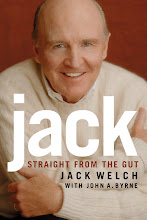Monday of this week was a big day for me. I launched
http://PoetsandQuants.com, the first in a network of niche business websites. The site is devoted to the coverage of MBAs and graduate business education. One of the most fascinating aspects of our debut is what Google has been able to discover, or fail to find, about the site. First off, a little background. This is not a blog, but a website chock full of stories, analysis, photographs, and video. It's updated daily. It has been written about by BusinessWeek and The Wall Street Journal. It has been heavily supported via social media with a Twitter feed, a Facebook page, a LinkedIn group, and a YouTube channel.
So what do you find when you Google "poetsandquants?" Not a single mention of the actual website. On page one of Google's results, you'll find links to my Twitter feed, to this blog, to the blog of an MBA applicant who has been featured on the site, and finally in the top five, a link to my YouTube channel. In sixth place is a bogus operation called sitereporting.org that offers an entirely inaccurate report on the site generated by an algorithm. In the seventh and eight spots are links to a press release about the launch of
PoetsandQuants. In the ninth and tenth places are links to topsy.com and ubervu.com, sites that track and aggregate tweets. Still not a single link to the actual site I've created.
It gets worse. As you go through the first five pages of Google results, there are all kinds of websites that have essentially highjacked Google, rendering its search product less useful and helpful to users. There's a so-called
weblog that is little more than a place to advertise Viagra and Cialis. There's links to TweetMeme, Interceder, tweetcepts, twapperkeeper, rallyclips, and whotechpunditstweet, among many others. Most of them are search traps that have gamed Google. There's even a link to one fool who has no idea who I am yet calls me a "
douchebag" on page three of Google's results for
PoetsandQuants. (See the screenshot below to get a real glimpse of how bad Google's results are.) Get through the first ten pages of results and there is still not a direct link to the site.
I then Googled (don't you hate that it has become a verb?) the headline to the most popular story on the site for the past three days: "Our New MBA Ranking of the Top 50 Schools." There's TweetMeme again in the first two results, Friendfeed in the second, Twitter in the fourth and fifth spots, and finally Facebook in the sixth position. Not a single direct link to the site that reported, wrote, edited and published the story.
A lot of the coverage of
PoetsandQuants is devoted to MBA rankings due to their popularity and controversy. For the launch, we not only published the new ranking referred to above. We also published a ranking of the top 30 schools outside the U.S., and even an analysis of the rankings cranked out by BusinessWeek, Forbes, U.S. News & World Report, The Financial Times, and The Economist, ranking the rankings. For the debut alone, there were a dozen different stories on MBA rankings. So naturally, I Googled "MBA rankings." Not surprisingly, there's not a single link to
PoetsandQuants in the first ten pages of results. I didn't bother to look much after that, I confess.
Now, it's not that I'm unaware of the importance of search engine maximization (SEO). When I was editor-in-chief at BusinessWeek.com, we had a full-time SEO expert on staff. I worked closely with my web developer on SEO issues for the WordPress platform we're built on. As I created the content for the site, I was careful to write simple headlines and multiple tags to allow Google to find all the information on the site.
So where is Google? I don't have a clue. Luckily, our traffic has been impressive out of the gate, thanks to the BusinessWeek and Wall Street Journal mentions, and all the attention we've paid to social media. Twitter and Facebook, in particular, are delivering amazing numbers of people to
PoetsandQuants. Every day, the traffic sets another new record. As for Google, nothing. This goes to the quality of Google's primary product: search. If Google can't find PoetsandQuants or any of the stories published on the site, I wonder how many other legitimate, substantive efforts are also going undiscovered because Google's algorithms have been so effectively gamed.
Or am I judging Google unfairly? Does the mother of all search engines take a lot longer to find that needle in the haystack that
PoetsandQuants obviously is.

















